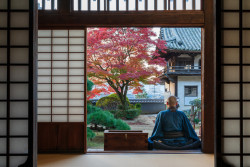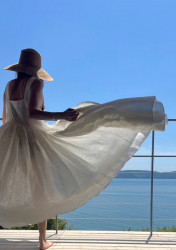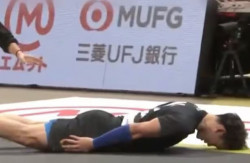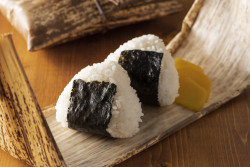
April 16, 2009
Playtime in the City
Find your inner athlete with the help of a local sports team
By Metropolis
Originally published on metropolis.co.jp on April 2009

Illustration by Phil Couzens
Want to squeeze into a skimpy bikini or a tight pair of swimming briefs this summer? Or maybe you’d just like to sweat out the stresses of city life and get in shape for the beach? Then put that pint down and join one of these foreigner-friendly sports teams. Ranging from the outlandish to the subaquatic, Tokyo is teeming with athletic diversions.
The essence of parkour is to get from A to B as adroitly as possible. Traceurs, as practitioners are known, move like fugitives running from the law in a Hollywood flick, scaling any obstacle in their path. Hajime Uchimura of Tokyo parkour club PKTK says the activity “opens an exciting world of possibilities, allowing the body to move the way it was designed to.” PKTK (above) has 12 core members, with about 20 traceurs jamming in free sessions on the first and third Sunday of each month at urban venues like Tama Plaza and Odaiba. Those bold enough to try out should wear sports clothes and tight-gripping, shock-absorbing shoes—pads optional.
See http://pktk.jp (Japanese) or email pktokyo@gmail.com (English OK) for more info.
On Wednesday evenings, a “Barbarian Horde” pounds the track at Oda Field, just across the street from Yoyogi Park. Known as Namban Rengo, the group is a relaxed and friendly running club aimed at foreigners (14 different nationalities) and internationally minded Japanese who want to enter races and triathlons. In addition to the weekly workouts at the track, Namban organizes weekend runs around Tokyo. About 110 runners are on the mailing list, 40 of whom participated in last month’s Tokyo Marathon. There are no fees or other requirements; anyone is welcome to run anytime.
Contact Bob Poulson at roadrunr@gol.com or 0424-78-1223 for more info, or see www.namban.org.
Ballsax, Hotdogs, Smoker, Pubes, The Predator, Huddo, Homebrew and Ooh Ahh. These are some of the least racy nicknames for members of the Tokyo Goannas Australian Rules Football Club. Though the players are known to keep the cash register ringing at Paddy Foley’s pub, they also take their footy seriously—the team is the most successful of the seven squads in the Japan AFL “Top League” Competition. Named after an Australian monitor lizard, the Goannas play about 12 games during the April-November season and train on Sunday afternoons near Futako-Tamagawa Station. The club’s motto is “Play hard, party hard and always respect others.”
For info, contact tokyogoannas@gmail.com or see www.tokyogoannas.com.
Tokyoites who enjoy swimming with the fishes (literally) should try out Mar Scuba, the capital’s oldest full-service dive operation serving the foreign community. Offering PADI scuba training from beginner (Open Water) to professional (Divemaster and Instructor), the group also organizes weekend dive tours to the Izu Peninsula and, in summer, hammerhead shark trips. Mar Scuba conducts over 100 dives a year, with over 200 members from all walks of life. Two-tank boat dives and beach dive tours cost ¥18,900 and ¥14,700, respectively. The fee includes transportation from the nearest train station to the venue, instruction (all English-speaking), lunch, drinks and ocean fees and admission charges.
Email matt@marscuba.com or call 090-3851-3901 for details, or see www.marscuba.com.
Boot your hanami hangover into the back of the net with a Sunday afternoon kick-about with the Tokyo Gaijins. The group holds friendly one- or two-hour sessions at Aquafield in Shiba Koen, where you can almost touch the steel of Tokyo Tower, or at Shibaura Chuo Koen near Shinagawa station. The games are informal—just show up, sign in, and play for the side that rock-paper-scissors assigns you to. A maximum of ten players can join the hour-long sessions (reservations required), and 20 can play in the two-hour games. The fee is ¥1,000 per person.
To get on the mailing list, email futsal@tokyogaijins.com.

Photo courtesy of Kyoko Obayashi
The Tokyo Thirteen Warriors are Japan’s only rugby league team—and only one of three that play the nonstop, noncontact OZ tag. The Warriors get together every Saturday at Tatsumi no Mori Sea Park in Shin-Kiba to play tag from 10am-noon, and the 13-man code from noon-1:30pm. Tag players range from an Australian middle school student to a 50-year-old Japanese gent. The rugby league side tours Australia every year and is very active socially, with BBQs and visits to the pub to watch State of Origin games.
For info, email tokyorugbyleague@hotmail.com or see www.geocities.jp/japaneserugbyleague/.
Footy Japan acts as a mini international football association (free of FIFA’s politics). In addition to the British Football Academy schools for kids and the Tokyo Metropolis League (an adult league of three divisions and 30 teams), it hosts futsal sessions and tournaments throughout the year. Among Footy Japan’s 800 members is a former Paraguayan international and ex-pros from Spurs, West Ham, Urawa Reds and Dynamo Moscow. More than one player has been heard to say, “If it weren’t for Footy Japan, I’d have left Japan a long time ago.”
For details of the league and clubs, see www.footyjapan.com, call 03-3770-0288, or email info@footyjapan.com.
If you pine for the long days of a childhood Canadian summer playing street hockey in the back alleys, look no further than the Tokyo Street Hockey Association. The TSHA holds free games in an Akasaka park almost every Sunday—all you need to do is just bring a piece of lumber. The group is also starting a more formal league in May with teams pulled from the TSHA and the Japanese “Misconduct” roller hockey league. The TSHA’s claim to fame is that it might have the longest running advertisement in Metropolis, having been in the classifieds since around 1997.
Slapshot an email to info@tokyohockey.com or see www.tokyohockey.com for more info.
Rowing in Japan is typically an old-school-tie affair, limited to university and company crews. But a handful of clubs embrace outsiders. With approximately 100 members, the Partex Rowing Club meets every Sunday at a course in Saitama to row eights, fours and all classes of sculling boats. Partex takes part in more than ten regattas a year throughout Japan, with its finest oarsmen and -women also competing internationally. You don’t have to be Steven Redgrave to join—those with limited experience are also welcome.
See www.partezrowing.com (Japanese only) or contact hazama@nifty.com (English OK) for details.
The Tokyo Hammers were born out of frustration. A group of baseball enthusiasts who were annoyed with teams that play as an excuse to booze and gamble formed the club in 2005. The Hammers are always on the lookout for new members—the only requirement is that they have high school or college experience so they can handle fastballs of 75mph or more. The team started out playing sandlot games but now concentrates on hardball matchups and tournaments. Costs are limited to the jersey, game and equipment fees.
Contact Roark at 080-3129-7798 or partywithroark@hotmail.com for details, or see www.ballcharts.com/hammers.
After jumping through hoops at work, members of the Tokyo Gaijins basketball club let off steam by shooting hoops at two gyms in Minato-ku. The group doesn’t have tryouts, practices or scheduled games—anyone on the mailing list can just turn up to the twice-weekly games whenever they have free time. While the sessions are strictly for fun, the games attract solid Japanese and foreign players, all of whom are guaranteed equal court time. Fees are ¥1,500 per person per session.
To get on the mailing list, shoot an email to basketball@tokyogaijins.com or see www.tokyogaijins.com/basketball.
Located on the Odakyu line 20 minutes from Shinjuku station, the Nitta Boxing Gym aims to be the “safest gym in the world.” Fourteen Japanese and foreign boxers, including several pros, work out under the watchful eye of Mr. Nitta, but complete novices are welcomed with open arms—or, more likely, a friendly jab. Nitta boxers compete at a number of professional and amateur tournaments every year.
Membership costs ¥18,900, with monthly fees of ¥12,600.See www.nittagym.com for info (Japanese) or contact Nitta (English OK) at n-boxing@beige.plala.or.jp or 044-932-4639.
The Nihon Unisys Bulls are looking for experienced foreign footballers to play or coach in this season’s X League—Japan’s premier semipro American football league. The Bulls play at prestigious venues such as Tokyo Dome or Yokohama Stadium, and while other X League teams train virtually full-time, this band of bus drivers, bakers—but no candlestick makers—practices on weekends at university grounds across Tokyo. The deadline for registration is at the end of June.
Email taiichi.oikawa@unisys.co.jp for details or call 090-9858-8466. The Bulls’ website is www.unisys.co.jp/football.
For most cricket connoisseurs in Japan, the only way to hear the dulcet tones of leather upon willow is a test match streamed on a temperamental website. The Tokyo Wombats, however, have been putting on their whites and taking the field in the Japan Cricket Association’s J1C Competition since they formed in 2002. The team has been crowned premiers for the past three seasons, but also stress the social side of the game (they’re sponsored by Australian winemaker Hardys). Comprised of a tight-knit international group of about 20 members, the club plays at five grounds across the Kanto region. Nets are held about once a month in Shinagawa.
For info, see www.tokyowombats.com or email info@tokyowombats.com.
Ultimate Frisbee is a field sport in which two teams of seven try to score points by catching the disc in one of the end zones. There are no referees— disputes are settled according to “the spirit of the game.” The Outdoor Japan Ultimate Group plays coed pick-up games on Sundays at 2pm alongside the Tamagawa river near Futako-Tamagawa station, and on weeknights at Hiroo Junior High School—just turn up with decent cleats or training shoes. The group has spawned two competitive teams, one of which is named “Iku” (let your imagination run riot!).
See www.outdoorjapanforums.com or www.outdoorjapan.com for details.
Motto: Birotae et cervicia (“bicycles and beer”)
Half-Fast Cycling is, as the name implies, a less-than-manic approach to the sport of bicycling. They don’t go too fast, but they don’t go too slow, either. Members view themselves as a group of regulars at a bar, except the bar is in a different place each weekend and the patrons are more fit than most, having had to cycle 40km before the first brew. Meetings are held every second Wednesday of the month at The Pink Cow in Shibuya/Aoyama. HFC arranges rides for every level, from 30km beginners’ confidence-building courses to 150km-plus hill-climbs, sometimes involving trains or overnight ferries. Anyone can join, but newcomers to the sport are expected to improve. No dues. The majority of the rides take place in Tokyo, maximizing bike trails and greenery and minimizing contact with vehicular traffic. Very cool club jerseys. Operated by Metropolis’ Movie Man Don Morton, Dictator for Life, and Webmaestro & Trusted Lieutenant Mike Sims-Williams.
For more info, see http://halffastcycling.com or sign up at halffastcycling@hotmail.com







